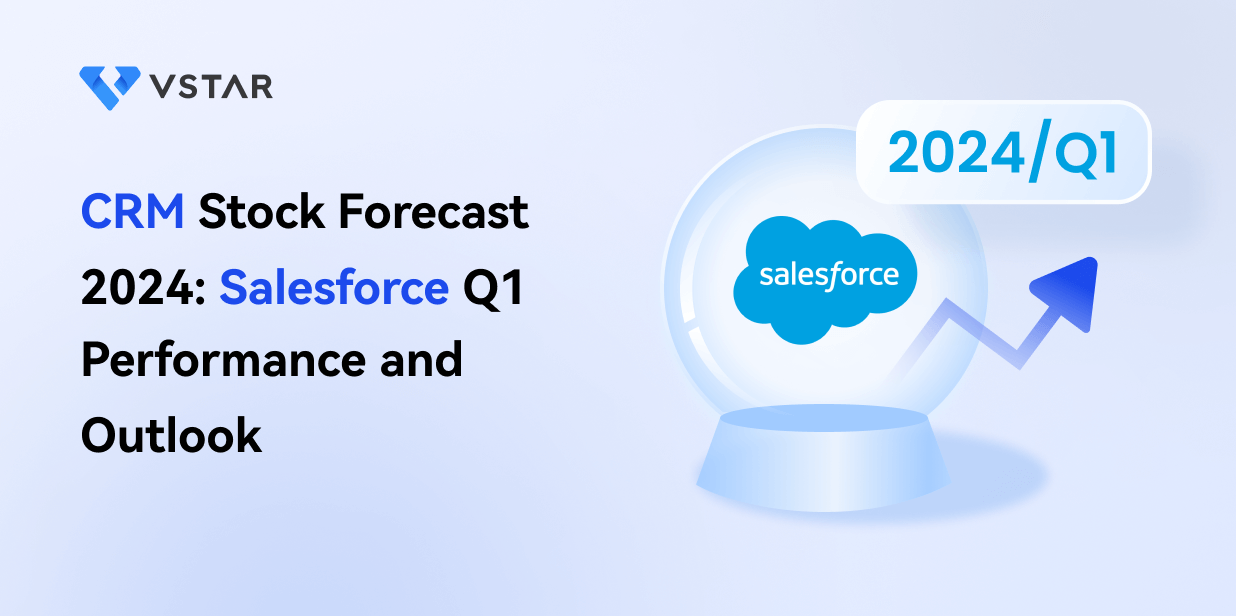
- Salesforce reported strong Q1 FY2025 results with significant revenue growth and operational efficiency.
- Future growth opportunities lie in Data Cloud integration, industry-specific solutions, and AI adoption.
- CRM stock price prediction technical analysis provides a 2024 price target of $368 for CRM, projecting a recovery from current stock price dip.
- Fundamental analysis indicates Salesforce's valuation is more attractive compared to historical trends.
- Competitive pressure based on technological edge is a key risk to Salesforce's performance growth.
I. Salesforce Q1 2024 Performance Analysis
A. Key Segments Performance
A. Financial Highlights
Salesforce reported robust financial results for Q1 FY2025, ended April 30, 2024. The company achieved a revenue of $9.13 billion, marking an 11% year-over-year (Y/Y) increase both nominally and in constant currency. Subscription and support revenue was a significant contributor, growing 12% Y/Y to $8.59 billion. The company's GAAP operating margin was 18.7%, while the non-GAAP operating margin stood at 32.1%, reflecting a disciplined approach to cost management and operational efficiency.
The firm demonstrated impressive cash flow performance, with operating cash flow surging 39% Y/Y to $6.25 billion and free cash flow increasing by 43% Y/Y to $6.08 billion. Salesforce returned $2.2 billion through share repurchases and distributed $0.4 billion in dividends to shareholders, highlighting its commitment to returning value to investors. The balance sheet remained strong, with a current remaining performance obligation (CRPO) of $26.4 billion, up 10% Y/Y, indicating robust future revenue streams.
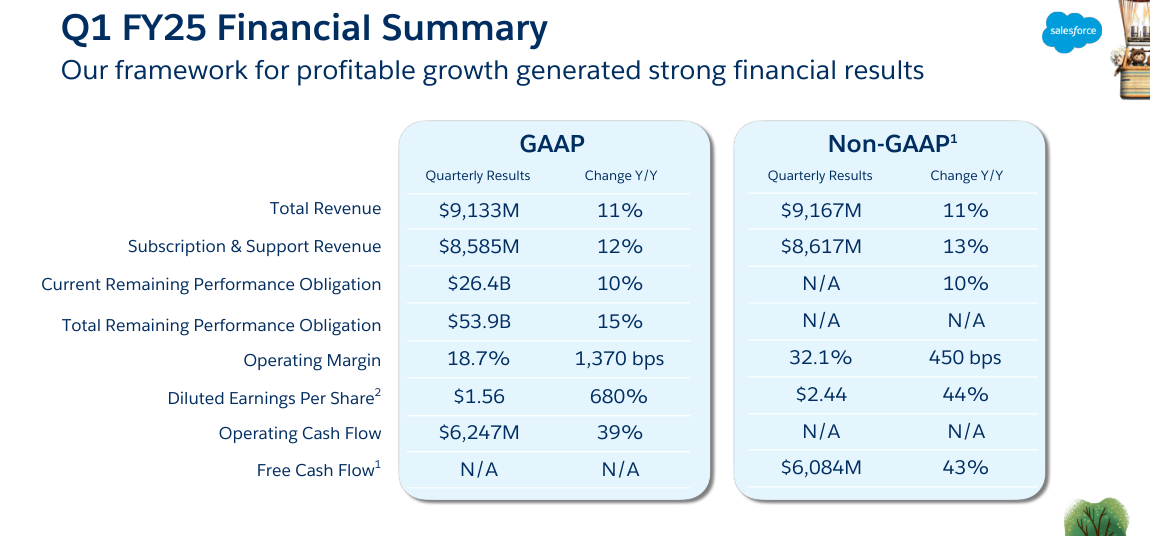
Source: Q1 FY25 Quarterly Investor Deck
B. Operational Performance
Salesforce's operational metrics underscore its market leadership and strategic focus. As the #1 AI CRM, Salesforce manages over 250 petabytes of customer data, critical for AI-driven customer relationship management. The company's product portfolio saw significant traction, with Data Cloud emerging as a standout performer. Data Cloud contributed to 25% of deals over $1 million and added over 1,000 customers for the second consecutive quarter.
Market share analysis from IDC confirms Salesforce's position as the leading CRM provider for the 11th consecutive year. The company's diversified product suite, including Sales Cloud, Service Cloud, Marketing Cloud, and Commerce Cloud, continues to drive multi-cloud adoption. Nearly half of Salesforce's top 50 wins in the quarter involved six or more cloud products, underscoring the comprehensive nature of its solutions.
C. Technological Advancements and Innovations
Salesforce's technological advancements have been pivotal in maintaining its competitive edge. The company is at the forefront of AI integration, with its Einstein AI platform generating billions of predictions daily. The recent launch of Einstein Copilot, Prompt Builder, and Einstein Studio has empowered customers with advanced generative AI capabilities. These innovations have seen rapid adoption, with hundreds of Copilot deals closed since their general availability.
The introduction of Slack AI further exemplifies Salesforce's innovation, enhancing collaboration and productivity. Slack AI, launched in February, provides features like recap summaries and personalized search, with customers summarizing over 28 million Slack messages since launch. Additionally, Salesforce's internal AI adoption has saved its engineering teams over 20,000 coding hours per month, showcasing operational efficiencies.
In Q1, Salesforce launched several new products and initiatives. The Data Cloud is poised to be the company's next billion-dollar cloud, integrating customer data across systems to provide a single source of truth. This facilitates AI-driven insights and actions across the Customer 360 platform.
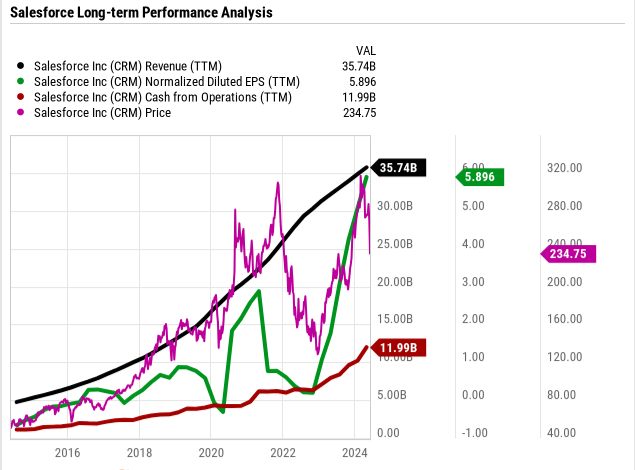
Source: Ycharts.com
B. CRM Stock Price Performance
In Q1 Fiscal 2025, Salesforce (CRM) experienced a -5% decline in stock price, opening at $282.01 and closing at $268.94. The stock's high during the quarter was $318.71, while the low was $268.36. This performance contrasts sharply with broader market indices; the S&P 500 posted a 3% return and the Nasdaq-100 saw a 1% return. The underperformance of CRM relative to these indices suggests company-specific challenges and the street concerns, despite a significant market cap of $261 billion.
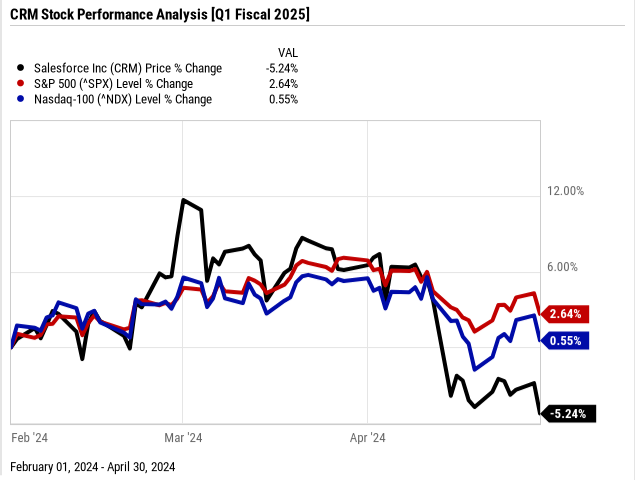
Source: Ycharts.com
II. CRM Stock Forecast: Outlook & Growth Opportunities
A. Segments with Growth Potential
Data Cloud Integration:
With 250 petabytes of customer data managed, Salesforce's Data Cloud segment stands out for significant expansion. This vast repository facilitates informed decision-making and enhances customer experiences, as evidenced by its integration into various Salesforce offerings like CrowdStrike. As per mordorintelligence.com, the Cloud Computing Market may hit $0.68 trillion in 2024 expanding at a CAGR of 16.4%. As per Gartner, Cloud Application Services (SaaS) spending may expand by 20% to hit $247.2 billion in 2024.
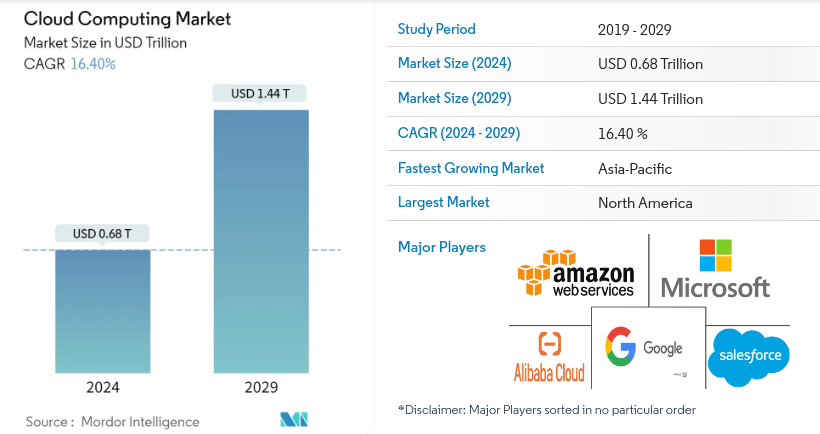
Source: mordorintelligence.com
Expansion in Industry Clouds:
Salesforce's industry-specific cloud solutions offer tailored functionalities, driving growth in vertical markets. The adoption of industry clouds, exemplified by success stories like Paychex and the City of Los Angeles, signifies significant market potential. This segment's revenue growth is forecasted at approximately 22.7% in 2025, indicating sustained momentum. As per gminsights.com, Industrial Cloud Platform market may hit a growth rate of 17.5% (CAGR) in 2024. As per Technavio, the private cloud services market may grow at 26.71% (CAGR) in 2024.
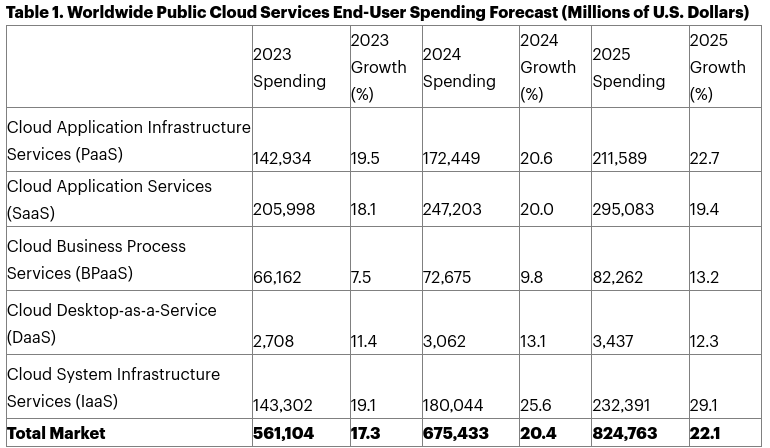
Source: gartner.com
AI Adoption:
Salesforce's Einstein platform presents substantial growth opportunities. AI integration across multiple clouds enhances predictive analytics, personalization, and automation, fostering deeper customer engagement and operational efficiencies. Notably, AI-driven capabilities like Einstein Copilot have closed hundreds of deals, indicating strong market adoption and growth potential. As per mordorintelligence.com, the Cloud AI Market size is estimated at USD 67.56 billion in 2024 and expected to grow at a CAGR of 32.37% till 2029.
B. Expansions and Strategic Initiatives
Mergers and Acquisitions (M&A):
Strategic acquisitions like Slack Technologies, MuleSoft, and Tableau bolster Salesforce's market reach and product portfolio. These acquisitions contribute to revenue growth, with FY25 guidance projecting a revenue range of $37.7 billion to $38.0 billion, up 8% to 9% year-over-year. The acquisition of Slack Technologies, in particular, enhances collaboration capabilities and expands Salesforce's ecosystem.
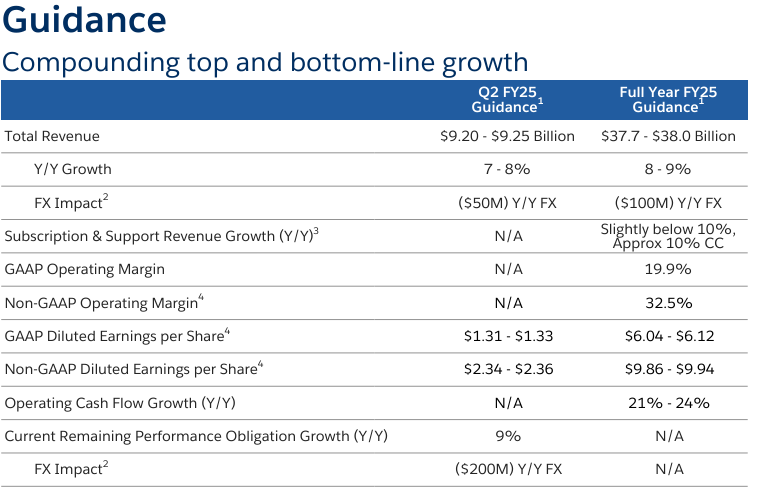
Source: Q1 FY25 Quarterly Investor Deck
Research Investments:
Salesforce's commitment to R&D drives innovation and product enhancement. Continued investments in AI, data analytics, and cloud infrastructure enable Salesforce to deliver cutting-edge solutions. These investments support revenue growth projections, with subscription and support revenue expected to grow approximately 10% year-over-year in constant currency.
Partnerships and Collaborations:
Collaborations with industry leaders like Amazon Web Services (AWS), Google, IBM, and Microsoft amplify Salesforce's market presence. Partnerships with AWS streamline deployment processes, enhancing customer accessibility and scalability. These collaborations contribute to revenue growth, with Salesforce products now available on the AWS marketplace, facilitating expedited deployments and flexible budgeting options.













